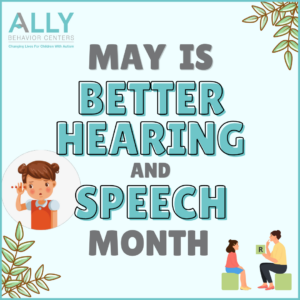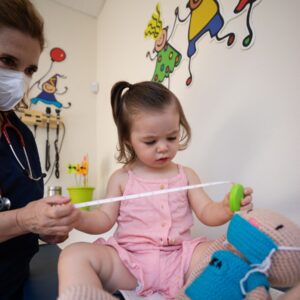When is it time for a toddler to get their hearing checked?
Each May, Better Hearing and Speech Month, provides us with an opportunity to highlight the importance of communication and getting your child’s hearing checked.
Can my child hear me?
As parents of young children, we are routinely monitoring our child’s development for new milestones and behavior changes. What happens when things seem a bit off and your child is not reacting to you or the world around them? Running to a search engine can introduce worries you’d never imagined on your own. Instead of jumping immediately to a long list of possibilities, contact your pediatrician to share your concerns. They may suggest that your child get their hearing checked using a hearing test which is relatively simple and non-invasive.
Wasn’t my child’s hearing tested when they were born?
A newborn hearing test is of course the first chance to learn that a child’s hearing could be a concern, but acquired hearing loss happens over time and can sometimes be overlooked for some time in a toddler. Head trauma, exposure to loud noises, illness, or certain medical treatments, can result in either temporary or permanent hearing loss. Depending on the type of loss and what caused it, ear tubes, surgery or medication may restore a child’s hearing. Read on to see if your child’s hearing should be tested.
What are some of the signs?
Hearing has an enormous effect on a child’s cognitive development, learning how to communicate, and overall behavior. It is a major factor in how anyone interacts with the world around them. This is especially impactful in a child’s early years when they are constantly learning about the world around them. Can you imagine going through your entire day only being able to hear maybe 60% of the sounds around you but not even being aware of it? This is what some children are experiencing.
How do you know that your child may be having some difficulty with their hearing? It can look different at different ages but here are a few examples.
- Newborn to 4 months old: your child should startle at loud sounds, respond to a familiar voice with a smile, and be able to calm down by a familiar voice as well; just to name a few.
- 4 to 9 months old: your child should begin to notice and respond to toys that have sounds, start to make babbling noises, and understand familiar motions like waving hi.
- 9 to 16 months old: your child should be starting to repeat simple sounds, responding to their name, and using their voice to get your attention.
If any of these milestones are not occurring by the time your child is a toddler, you should take your child to the pediatrician for an expert’s opinion.
Why is my child having difficulty with their hearing?
There could be a wide range of reasons why your child is having a hard time hearing. In addition, there are different degrees of hearing loss. Some children have a slight hearing deficit, while others might suffer from mild or severe hearing loss. Hearing loss can affect both ears (bilateral) or only one ear (unilateral).
Congenital hearing loss refers to hearing loss that a child is born with. Close to 50 percent of congenital hearing loss in children is due to genetics, meaning it was passed down from the parents. It isn’t always present at birth, it can often show up later on in life. Premature birth is another common cause of congenital hearing loss, one that is not affected by genetics. A nervous system or brain disorder, drug or alcohol abuse by the mother during pregnancy, other birth complications, and a series of other reasons could be a catalyst to a child being born with hearing loss.
Not all children that experience hearing loss are born with it. A few reasons why a child could have difficulty hearing during their development could include a serious head injury, early exposure to loud noises, untreated or frequent ear infections, a perforated eardrum, or illnesses such as measles, mumps, meningitis, or whooping cough. More common causes of temporary hearing loss include middle ear infections, swimmers ear, or impacted ear wax.
What to do now?
Now that we know what to look for and after seeing a pediatrician or audiologist, maybe even why my child suffers from hearing loss, what are the next steps? The reason and severity of hearing loss in your child will determine what the next steps are. Treatment could range from removing a foreign object or wax plug which could’ve led to a blockage in the ear canal to hearing aids, ear tubes, surgery, cochlear implants, or medication. Studies show that treating hearing loss in children sooner than later leads to significantly better outcomes in speech and language development.
What if my child’s hearing is fine?
The sooner you get results, the better the outcome will be for your child. If things are normal after getting your child’s hearing checked, then it’s time to keep searching for answers and figure out what their behaviors could be telling you. Often, this is when a child is screened and potentially evaluated for a developmental delay or neurological diagnosis such as autism. Here at Ally, we have clinical psychologists who are able to provide comprehensive diagnostic evaluations for young children. We are also equipped to treat children who are already diagnosed with autism with ABA, speech, and occupational therapy.
To learn more about our program and the services we offer, check out the services page on our website.
[References]

